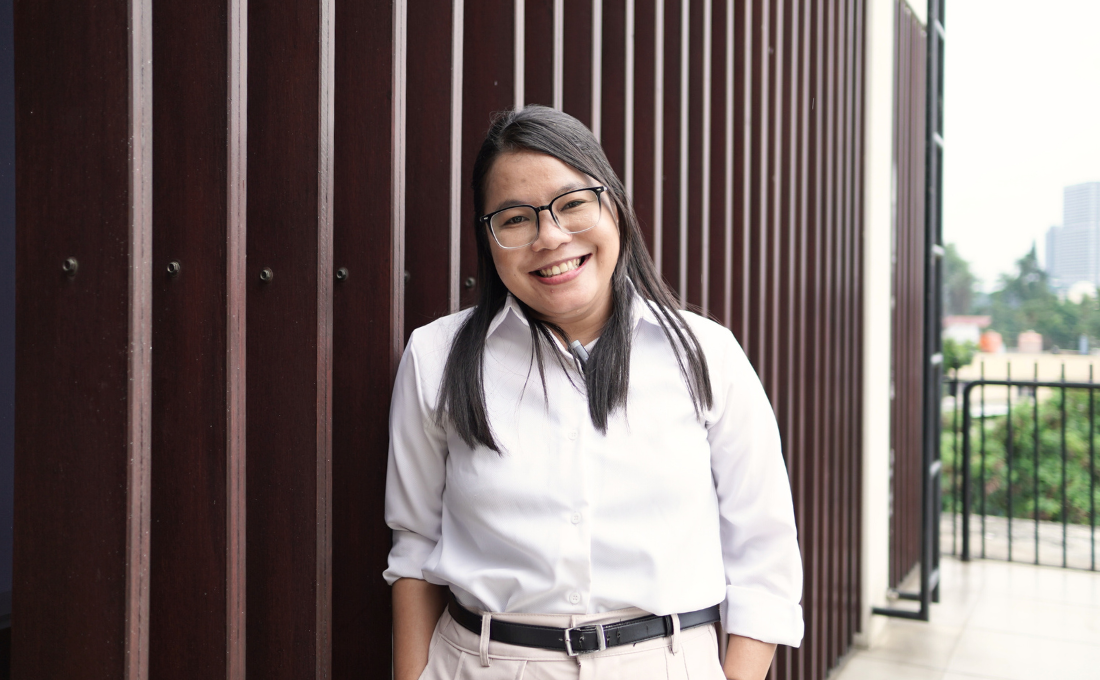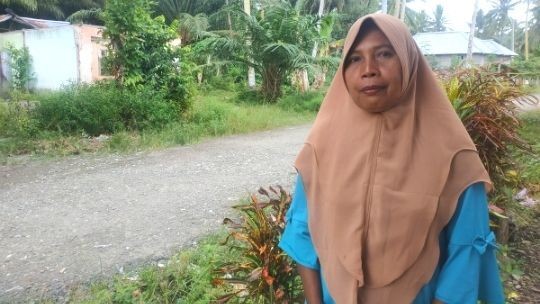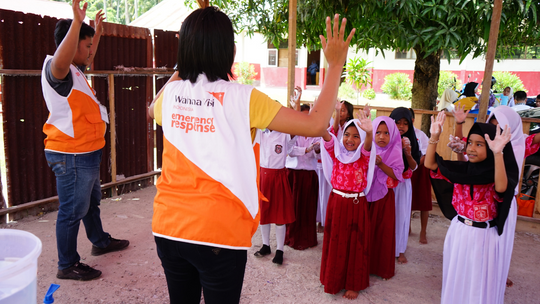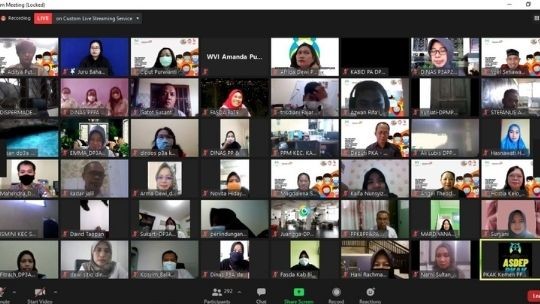Empowered Sumba Woman in the Capital City

"In my village, I was the first girl to leave for higher education," Maria Goreti said, opening her life story. Today, she has become a Sumba woman working as a Co-Creator Development at Narasi TV. She reached this point of achievement by successfully navigating a life process full of dynamics since childhood.
A classic Indonesian rural scene was a reality for Nana, as she is fondly called. A village surrounded by hills, meadows, and rice fields was Nana's home from childhood to adolescence. Her village is located in West Sumba Regency. Her parents worked as farmers, like most other people there.
Ten years ago, electricity had not yet reached the village where Nana lived. Children had to draw water first to bathe before school. The journey to school had to be made on foot. "When I was in first and second grade of elementary school, due to very limited classroom space, I had to study in what used to be a garbage dump," Nana recalled. However, she was able to overcome the many barriers she experienced with the support of her family and Wahana Visi Indonesia.
From 1999-2014, Wahana Visi Indonesia provided community development programme in West Sumba Regency. Nana was one of the sponsored children from WVI's assisted villages at that time. In addition to limited access to services and facilities, children in West Sumba also faced issues of protection and gender inequality.
"Thankfully, amidst the limitations I experienced, when I was little and in school, there were WVI sisters who accompanied me in the Children's Forum. That's also what led me to get to know the outside world, both through the screen and through activities facilitated by WVI," said the woman who also manages the Narasi Book Club.
A Girl Free to Flourish
The patriarchal culture in West Sumba accompanied Nana's growth. As the youngest daughter, she was expected to help her mother manage the house and garden. "Don't even dream of going to high school or having the opportunity to work in the public sphere," she said. Due to this perspective, as a teenager, Nana saw how her female peers gave up their education for marriage or work as migrant labourers.
Economic and cultural pressures ultimately positioned girls in West Sumba as a shortcut to quick money. Women's empowerment was a luxury or an investment that seemed slow to yield results. "Because parents feel that if there is no more money for school, then please get married so that parents can get a dowry. Or, just work to boost the family economy. So girls, if they don't become the breadwinners of the family, they are the ones who are most often sacrificed," said Nana.
In the community, a cycle of violence against women is formed. Girls drop out of school, marry at a young age but are not financially stable. They are forced to bear the double burden of being a working mother. Meanwhile, the only available jobs are as female migrant workers. They have to leave their children in the village, without clear care. "Thankfully, if their husbands still want to take care of their children. But if they are entrusted to families who do not pay attention to children's rights, the problems become even more doubled, more complex," explained this woman who loves to read.
This reality became Nana's motivation to actively participate in the Children's Forum facilitated by WVI and to commit to continuing her studies to university. In addition, she also wanted to make the most of the freedom to participate and develop given by her parents.
"One thing I remember most from my father, when he went anywhere, if he found magazines or used books that people threw away, my father would take them and bring them home, piled up to read. My parents felt that, even though they didn't go to school, they would give me space to keep learning as much as possible," Nana said.
She grew up differently from most girls in her village. Nana actively participated in activities at school and in the community, and had a variety of reading materials. She became a girl who made her parents proud with a series of academic and non-academic achievements.
"My father and mother always advised, as long as the school and other activities I participate in are good, I also don't harm other people, please and continue what I feel is good for my future. My parents will support in their own way, even if it's as simple as being a defensive wall when people give negative comments about my activities," she said.
Nana successfully completed her education to a Bachelor's degree. She is an alumna of the Faculty of Communication Studies at Nusa Cendana University in Kupang. She pursued higher education through a scholarship. The various Children's Forum activities she participated in, her excellent academic achievements, and her parents' blessing to continue pursuing her dreams became a portfolio that perpetuated Nana's educational journey. The habits that were built when she was active in the Children's Forum became useful provisions in college. Nana had the confidence to express her aspirations. Her involvement as a child researcher also made her more familiar with the ins and outs of research that is widely carried out in lectures.
A Young Woman with a Humanitarian Calling
"My job at Narasi isn't something instant. It's the result of a process I've been through since I was involved in the Children's Forum. Even though I was just a little girl from a village that had no signal or electricity at that time, I can work in the media in Jakarta. This dream come true is something I am very grateful for. Now I am sure that my humanitarian calling is through the profession I pursue," explained Nana.
She started this profession by becoming a participant in a basic writing and journalism training that WVI used to facilitate. "That's what actually formed my seed to experience and then live out my calling as a media worker," she said. While going through it, Nana increasingly realised that her profession was also a channel for her anxieties, a channel for her criticism of policies that were not in favour of vulnerable groups, and a channel for meeting various levels of society.
"When I was in the Children's Forum, I voiced children's and women's issues in children's language. But as I learned more, met various people who had concerns about similar issues, it became sharper, more filled with my alignment with the issues that had been worked on since I was accompanied by WVI from 2005 to 2014."
Of the many transformations she experienced, Nana determined one of the most valuable, namely, an understanding of children's rights. Before WVI came and accompanied children and communities in her village, she did not know that every child had a number of rights that had to be recognised, respected, and fulfilled by adults and the state. "When I was a child, I should have been in school, not being the breadwinner of the family or getting married. And I had a new perspective, it turns out that the application of children's rights is not as complex as what is discussed in the Law," she explained.
Children's rights are simple but must be meaningful. While accompanied by WVI, Nana's rights as a child were recognised by being allowed to choose a roommate when participating in activities, being allowed to choose a food menu during training, or being allowed to determine the dos and don'ts during sessions. "These things made me really feel what is called meaningful participation. This asset of knowledge is the most valuable for me and has been carried over to my life now."
Now, she also lives out the calling to be an inspiration for other girls. Her life dynamics as a child, teenager, and adult can be a reflection for other girls. Nana concluded, "If I hadn't joined the Children's Forum, I wouldn't have known that I had a talent for public speaking and writing. I managed to find it when I was more active in communities that could provide a comfortable and safe space for me to continue to grow."
The value that Nana believes in today is that within every human being, especially women or other vulnerable groups, there are always potentials and opportunities waiting to be discovered by that person themselves. Therefore, continue to explore. A practical way is to build networks and socialise with communities that match your interests. Don't feel small and afraid, but take advantage of all the resources you have. "Believe it, the little things we do every day are what will bring us closer to our dreams," Nana concluded.
Author: Mariana Kurniawati (Communication Executive)



